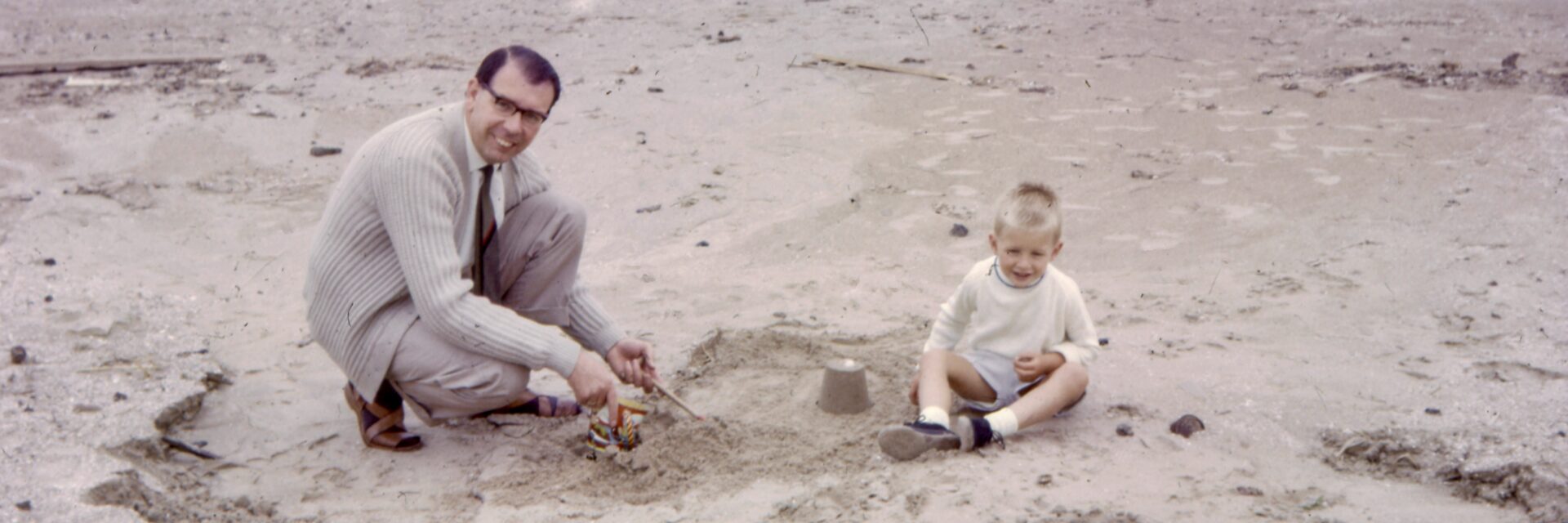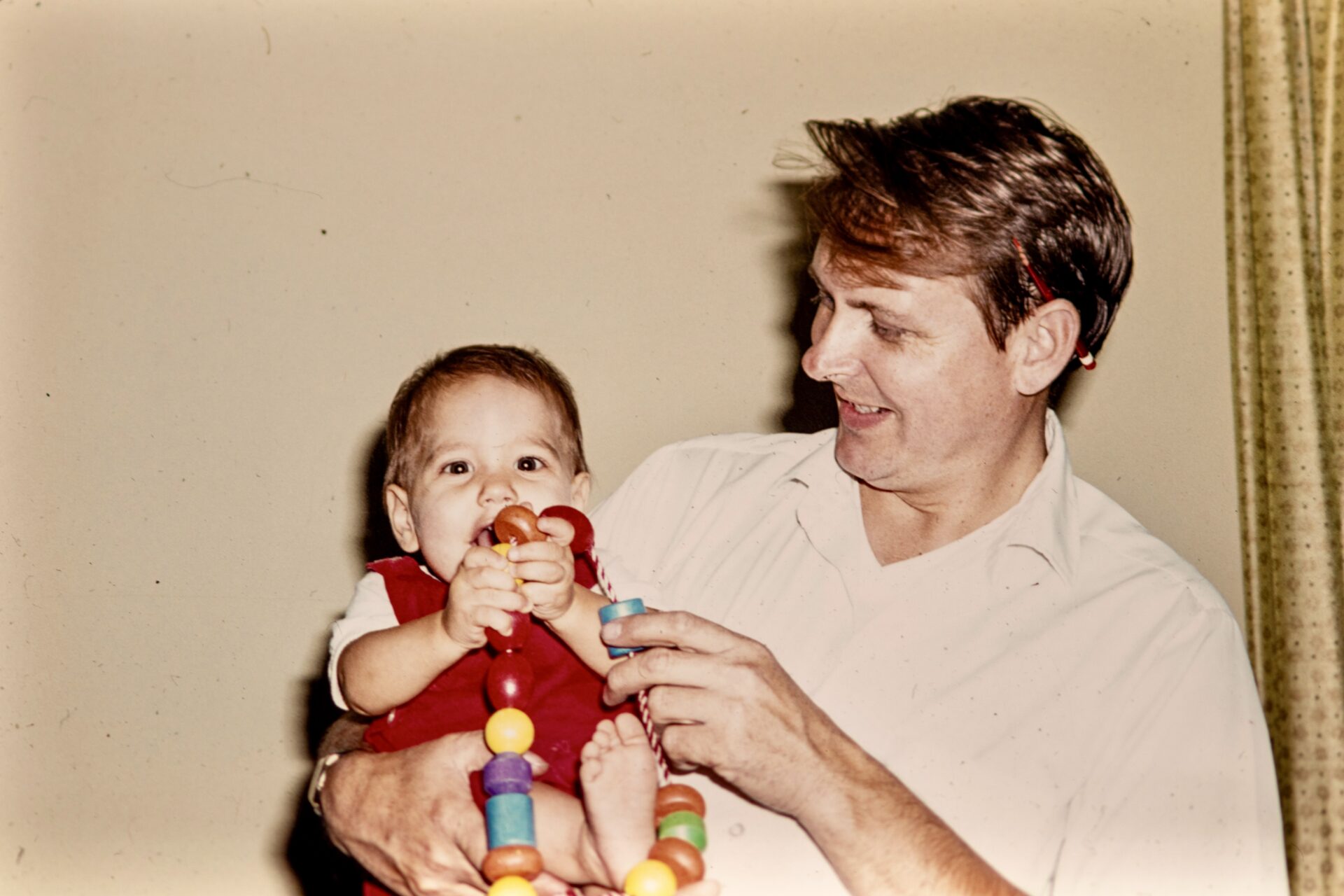


Written by Emily Cross.
14 minute read

Losing your dad can feel overwhelming…but you don’t have to face the emotions alone. Friends, family, welcome distractions, and even the written word may all have a part to play in your healing journey.
In our experience as a provider of direct cremation services, the act of supporting others through difficult times is as much about being present as it is about taking action and listening. While there may be times when you are alone or waiting for someone to visit, the words of a poem, quotation, or memorable saying are always there when you need them.
We hope that by sharing some funeral poems for Dad, you are able to find a way to feel connected with him for many years to come.
Key takeaways:

One of the most well-known British funeral traditions is the reading of written passages or tributes during the course of the service. Poems are a common choice as they combine an artistic and thoughtful approach with words with heartfelt sentiments that can connect with many of those present.
The use of poetic verse can convey grief, love, and remembrance by setting up a particular tone and rhythm. They are often used at the conclusion of the eulogy or as part of a series of smaller readings during the main part of the service. Others may find that a particular poem or verse ideally lends itself to being the final closing remark of the service.
Poems come in many forms, from many eras, and are written in a highly diverse range of styles. By exploring some of the emotionally sensitive options that are out there, you may find that you discover a verse that connects with who you are and what you are feeling right now.
Funerals, memorial services, and end-of-life celebrations each offer a setting in which you can pay tribute to your father. Here are some popular poems that talk about the timeless topics of love, honour, and family:
We share these poems purely to provide a starting point for your reading, not to judge your choices or attempt to push you in any particular direction. Using them to start the process may help you to explore the poetry world at a pace that you feel comfortable with.
The flexibility in terms of the tone, voice, and emotional detail that a custom-written poem provides is probably unmatched. Commissioning a skilled writer or student of poetry to write on your behalf is something that you may feel is a fitting tribute to your dad, particularly if he had a love of prose and literature.
Working with a professional poet may not be something you have done before, but the process is usually open-ended and highly fluid. Talking to them, conveying your emotions however you wish, and sharing any personal details you feel they need to know are how the creative process might begin. Depending on what you have agreed with the writer, you may then receive a variety of drafts and edits that allow you to make subtle refinements and changes that add deeper meaning to each line.
Alternatively, you may feel that writing the poem yourself is a welcome distraction. If you want to try it but find the many rules of poetic structures overwhelming, you may wish to start with a free-form poem. By making the rules up as you go along, this style of writing allows you to gradually uncover your inner creativity and find couplets and lines that start to resonate with you.
Shorter pieces lend themselves to being included on the back cover of the order of service where they can appear as both an aesthetic and literary addition. If you are writing with younger relatives and children in mind, you may find that a short poem with a rhyming structure is more accessible. Simplifying the language and focusing more on making it memorable than having some sense of complex artistic merit may help to make it feel more readable.
There are so many beautiful funeral poems that it may be hard to know where to begin. Some may decide that they only wish to include non-religious funeral poems, while others will be more open to words from different belief systems and spiritual outlooks. The choice is very much a personal one and not something that you should ever feel judged for or pressured into making.
You may want to consider matching a poem’s message to the life and personality of the person who has died so that it, in some senses, becomes an extension of them. If you find a verse that has the same values, emotions, and tone of voice as your dad, you may feel that it naturally extends his voice in a powerful way.
There is also the matter of whether you choose a piece that is spiritual, reflective, or celebratory. Considering the wider family and other mourners, as well as the nature of the death, may help you to set the tone and begin your search from the right starting point.
We are a family-run funeral provider with a passion for helping you in any way we can. We hope that you can find some helpful guidance in the following sections.
A poem may be read before or after the eulogy and be introduced in a variety of different ways. Some find that speaking directly after the eulogy and waiting until the completion of the reading to highlight who wrote the poem and what it means ties everything together in the most fitting way. Others may decide to open with a poem and use it to set the scene for the eulogy and any other additional readings.
Poems may be formatted within orders of service in a variety of ways. One of the most common is to devote the back cover to the poem, centralise it, and italicise. Some may find that adding a picture of their loved one above or below the poem makes it feel like an extension or an expression of their outlook on life.
Sometimes you may wish to quote just a few verses from a much larger poem, in which you have complete freedom to do so. If you feel that the verses stand alone and explain themselves, there is no need to highlight that they are excerpts. Directing anyone who wishes to read the whole poem by including the title and author’s name may be something to consider.
Keepsakes can take many forms and allow you to explore the many different symbols of grief in a personal way. Some find that engraving a short poem on a picture frame or locket helps them pay their respects and keep memories alive. Others may feel that a printed copy of the poem that can be displayed at home is more appropriate given how they feel.
Using poems in cards, memory books, or memorial slideshows may also be something you wish to consider. The visual and emotional function of printed poetry serves to highlight how the aesthetic form of the words — not just their meaning — may have an intense artistic quality.
Finding a way to talk about death and dying begins for many people by putting words down on paper. If you decide you want to write a funeral poem for your dad, you may wish to consider the following elements and rules of thumb:
Being kind to yourself and focusing on personal, authentic words rather than literary perfection may help you avoid putting too much pressure on yourself.
Some reading this may find that they wish to explore a common theme around fatherhood and parent-child bonds. Here are some examples of directions you may decide to take:
A theme of appreciation and enduring love provides space for emotional depth and a demonstration of how much your dad meant to you. Talking about what he did, how he cared for you, and even how he made sure you always felt safe may allow you to open up in a way that other forms of expression may not allow right now.
Reflecting on your father’s teachings and values may help you to think about the kind of man he was and the influence he had on many areas of your life. Many hearing your poem will derive a sense of comfort from such expressions, especially when they can see something of their own relationship with him in your choice of words.
Poems that acknowledge pain and departure may help ensure that grief and a sense of abandonment are not minimised. Balancing understandable sorrow and a healthy sense of reflection will allow you to find words that accept grief for what it is without being all-consumed by it. Thinking of the poem as a formal farewell that also cements a legacy is something you may find helpful to do.
Online resources such as Reader’s Digest offer a growing range of funeral poems if you would like to explore different styles, tones, and areas of focus. One of the fascinating things about the world of poems is that you will begin your search in one place and quickly find you have covered new ground you never expected to find.
Poems have been written for centuries and cover many areas of life that you may never have considered. Navigating how to cope with grief is, in large part, about maintaining some sense of perspective once the initial shock begins to pass. Actively searching for new types of poetry by using funeral poems for Dad as a starting point may open you up to new forms of personal expression and internal reflection.
We believe deeply that everyone can find a choice of words or a turn of phrase that expresses how they feel and what they are going through. You have the right to grieve at your own pace and in your own way, so please don’t put any pressure on yourself if you don’t immediately connect or gravitate towards a poem or particular writer.
We hope you have found some words of comfort and solace in our guide and want you to know that we are always here for you. If you want to help your own children deal with your death in the future, you may find that discussing our prepaid funeral plans at a time that feels right may help. You may also find our guide where we compare funeral plans helpful as it could introduce you to options you never knew you had.
Terms and conditions apply, you will receive a funeral plan summary before purchase.
Regardless of whether or not you need us right now, we are here to help in any way we can. You are never alone when you are processing the death of your father.



If you have any questions, would like a brochure or simply would like a chat through our services, our award-winning team is here to help.
Unlike other providers, we won’t hassle you with constant calls. We’ll simply ensure you have the information you need and leave you to come to a decision in your own time. When you’re ready for us, our team will be ready to help.
Two moving examples that you may wish to read are:
Even if you don’t feel any sense of connection with these poems, there are so many available online that you may be able to find something that resonates before you know it.
A first-person approach where you write as if you are addressing him directly may help you to open up and share your thoughts and feelings about him. An alternative approach is to write in a narrative style that feels more like you are stepping back and talking about his life in front of the rest of the mourners.
Yes, writing your own funeral poem for your father may provide a sense of emotional release and allow you to feel closer and more connected to his memory. Many people find that writing forces them to confront their emotions and clarify their thinking in a way that speaking with a friend or relative does not. By putting greater time and focus into each and every word, you may find that you begin to reflect more deeply on what has happened.
You may find it helpful to think about the character and personality of your father as well as what you wish his legacy to be. If he was a calming, reassuring presence in your life, you may decide that a poem that focuses on the continuity of life in its many forms is the most appropriate. If you see him more as someone who lived his best life, a celebratory poem that conveys a sense of joy at the beauty of life may be more fitting.
staging site last replicated: MISSINGNO.